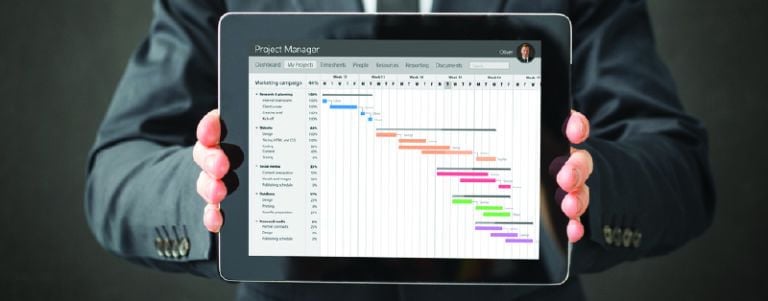What is Project Management? Meaning, Approaches and the Career Prospects

All the projects that companies undertake have a definite purpose, and timeline and are meant to create value through a unique result, product, or service. And, for achieving the desired results, a dedicated team and budget, a set of expectations and a schedule are defined.
Every project is unique in itself and different from routine operations and the ongoing activities of the organization as projects necessarily reach a conclusion once the defined goal is achieved.
Moreover, with globalization, technological advances and other dynamic factors taking over, there is a rising need of deploying highly skilled people having distinct skillset to manage different tasks. This is further giving rise to organizing work around projects with the teams being brought together on the basis of the skills needed for performing specific tasks. These projects are led and managed by project managers.
Now, let’s take a closer look at what exactly is project management and what is the role of a project manager.
What is Project Management and Who is a Project Manager?
Project management is the application of methods, processes, skills, experience, and knowledge to complete projects in accordance with the project acceptance criteria and within the agreed parameters. It has deliverables that are constrained to a defined budget and timescale. The key factors that differentiate ‘project management’ from just ‘management’ are the finite timespan and final deliverable, while management is an ongoing process. And, the person who ensures the team meets its goal within the set timeline is known as a project manager.
A project manager is responsible for leading teams, communicating with stakeholders, defining goals, and seeing the project through its closure. They may use different tools, approaches, and techniques to meet the needs of the project and are largely responsible for the success or failure of the project.
Project Manager: Skills, Tasks, and Responsibilities
The success of a specific project depends on the skillset of project managers. It takes more than just the project-related expertise to make the project a huge success. The skills required for project management include effective communication, excellent negotiating skills to manage suppliers and internal team conflicts, efficacious planning, scheduling and time management, risk management skills, technical expertise, critical thinking and problem-solving.
Ideally, project management involves four stages – initiation, planning, execution, and closure. And, throughout a project’s life cycle, a project manager needs to take up numerous tasks and responsibilities. A few of them,
Project Manager Role & Responsibilities:
- Defining the project’s scope
- Envisioning goals
- Managing growth
- Enhancing and maintaining efficiency
- Looking out for the competition
- Staying on schedule, and planning the cost of a project
- Sticking to a budget
- Managing the resources of a project
- Predictive risk assessment
- Leading quality assurance
- Selecting the right technology
However, it is next to impossible to gain these project management skills overnight or just by surfing the internet. It requires you to go through one of the thoughtfully-designed courses in project management and practice your skills for a period.
Project Management Skills
1. Earning a Diploma or Certificate Course in Project Management
This is one of the best ways to fine-tune your project management skills. Emeritus offers various certificate courses in project management in partnership with globally renowned universities. These project management courses are available online as well as offline and provide you with the technical expertise and the practical skills you need to navigate and lead complex projects to completion. It’ll also help you connect with industry experts across the globe who can guide you to advance your career.
2. Practice, Practice, Practice
Once you have earned a certificate in project management from a reputed university, all you need to do is acquire practical experience with the knowledge and skills you have gained as it would take some time to understand the application of these skills. Especially, if you are yet to break into the project management field, you need to seek opportunities for hands-on learning that would allow you to harness them.
Project Management Methodologies
A project management methodology is a set of practices and principles that guide you in streamlining and organizing your projects for ensuring their optimum performance. Simply, it is a framework that helps you in managing your project efficiently and effectively. We have curated a list of project management methodologies, out of which you can choose the one that will fit best with your objectives:
1. Waterfall Methodology
It is a traditional approach to project management. In this, tasks are completed in a sequential and linear manner and every stage of the project needs to be completed before the next one begins. The different stages of Waterfall project management follow a sequence,
- Requirements
- Analysis
- Design
- Construction
- Testing
- Deployment & maintenance
And, the progress also flows in a direction, exactly like a real waterfall does. However, it might also get dangerous in no time as everything is planned right in the beginning and there is a lot of room for errors if the predictions or expectations do not match up with reality. Moreover, there is no going back to the previous stage once that stage is completed.
2. Agile Methodology
This methodology was born from rising dissatisfaction with the traditional project management methodologies which follow a linear approach and cannot adapt a project as it progresses. With this, the focus began to shift to iterative models which allowed teams to revise their projects as required during the process rather than having to wait until the end to amend after reviewing.
The principles of agile project management methodologies are – it is collaborative, quick, and open to data-driven change. It involves short phases of work with testing at frequent intervals, reassessment, and adaptation throughout the process.
3. Scrum Methodology
Scrum methodology is a different form of agile project management. Instead of thinking of it as a project management methodology, think of it more like a framework.
In this methodology, the work is usually split into short cycles called “sprints”, which last for about a week or two.
Scrum Master, who is not similar to the Project Manager, leads small teams for every sprint’s duration, followed by reviewing performance in a “sprint retrospective” and making necessary changes before beginning the next sprint. If a business strives for continuous improvement, this proves to be one of the best methodologies.
4. Kanban Methodology
It is also a form of agile project management. “Kanban” term was originated from the manufacturing industry and denotes a framework within which the tasks are visually represented, and their progress is tracked through the columns made on a Kanban board.
In this, the work is picked and assigned from the pre-defined backlog continually as and when the team has the capacity and moved across the columns on the board, wherein each column represents a stage of the process. It works great for giving an immediate visual overview of the status of every piece of work at any given time.
5. Scrumban Methodology
Scrumban methodology is a mix of Kanban and Scrum methodologies. Scrumban allows the team to “pull” work from the backlog on the basis of the availability of time and capacity of the team members, instead of deciding the task from the backlog for working on every sprint at the outset.
During your sprint cycle (from scrum), you can keep a continuous and regular flow while incorporating project planning and retrospectives as needed using work in progress limits.
6. eXtreme (XP) Programming Methodology
This methodology is also a form of agile project management which was designed for software development. It largely emphasizes collaboration and teamwork across developers, customers, and managers. It has a set of rules that should be followed by teams and are based on five values – communication, simplicity, courage, respect, and feedback. If you want to foster collaboration and teamwork, this would be a perfect methodology to adopt.
7. Critical Path Methodology
It is a way of identifying and scheduling critical tasks comprising your project. You just need to follow a simple process –
- Identifying all the critical tasks
- Estimating the time each of them would take
- Using the information for scheduling the “critical path” you would take to get the project completed as soon as possible
Now, the longest sequence of critical tasks would become your “critical path” and define your project’s timeframe.
The Scope of Pursuing Project Management as Your Career
As companies strive to execute complex projects in competitive environments, the demand for highly skilled project managers is higher than ever before. Therefore, organizations are facing talent shortages, leaving them at significant risk. This makes it a little obvious that there are abundant career opportunities in project management for people who possess key skills that organizations need. Further, the demand is soaring for practitioners who have a necessary mix of competencies – a perfect combination of leadership and technical skills plus business acumen, which you can easily achieve by pursuing one of the project management courses that Emeritus India offers in partnership with the world’s top universities.
Choosing project management as your career can open doors in multiple industries. So, are you set to meet the demand? Sign up for one of the project management courses and upskill yourself to stand out amongst the competition.









